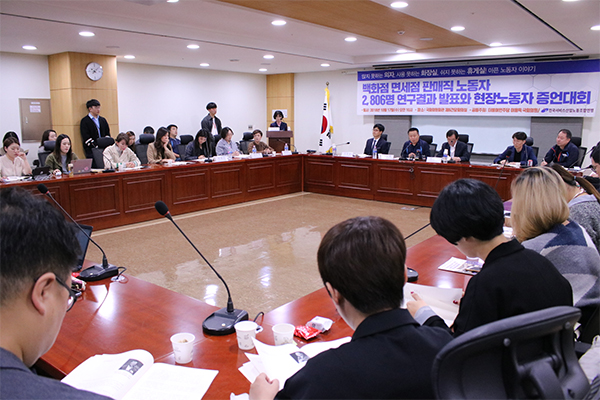(photo)

They do not have regular breaks for restrooms which are claimed to have caused the infection of bladder. Since they can not change sanitary pads at a right time, they are prone to skin inflammation. There are break rooms, but they are useless, as they are discouraged to use them. There are chairs beside them, but they can not use them to sit on. One out of ten workers had a miscarriage. This is a snap shot of the working reality facing retail sales workers in 2018.
Prof. Kim Seung-seop of Korea University and his team have conducted a survey examining the working conditions and health situation targeting 2,806 retail sales workers of the department stores and duty-free shops during the period of ten months between January to October this year. The working environment of retail sales workers are far more serious than the pieces of information about their working conditions and health which had been previously known. They could not sit on the chairs, while they work. They could not go to the restrooms at a right time. They could not have regular breaks. They have been suffering from all sorts of work-related illnesses.
Chairs mean a lot to retail sales workers like an oasis in the desert. A worker presenting her case in the testimony said that chairs are like "a bottle of cool water we can enjoy in a scorching summer day or a hot coffee we drink in a cold wave in the middle of winter." A social issue was raised in 2008 that retail sales workers stand and work all day long until they finish their work. At the time, the Korean Confederation of Trade Unions(KCTU) and other civic organizations organized a campaign to call on the department stores to provide retail sales workers with chairs to sit on for several months. Ten years have passed since the campaign started, but how much did it bring the changes to the workplaces?
According to the survey, 27.5 percent(771 workers) replied that "Chairs are not provided for them at the shops." 37.4 percent(1,050 workers) replied that "Provided chairs do not mean for them to sit on while they are working." This means that two out of three retail sales workers still stand and work all day long until they finish their work.
No adequate break time is followed by illness. In the past one year, 15.3 percent(428 workers) and 7.9 percent(223 workers) had diagnosed with varicose veins and plantar fasciitis respectively. These figures are very high compared with the average diagnosis rates of varicose veins and plantar fasciitis for the women aged between 20 to 49 years old in the 2013 data of the National Health Insurance Service which showed 0.6 percent and 0.5 percent respectively.
The survey also revealed that 59.8 percent(1,677 workers) had an experience that they could not go the restrooms at a right time while they were working during the past one week, citing the reasons of "back-up staff shortage", "restroom distance", and "insufficient restrooms for staff".
How do the workers cope with the situation at work? 42.2 percent(1,185 workers) replied that they refrain from drinking water. 20.6 percent(578 workers) were diagnosed with urocystitis. 39.9 percent(1,081 female workers) of a total of 2,708 female respondents had an experience that they were unable to change their sanitary pads at a right time. Of 1,081 female workers, 17.2 percent(466 female workers) replied that they had skin inflammation due to the difficulty of sanitary pad change.
A sales worker who was interviewed with the survey team stressed the importance of a break room for retail sales workers so that they could sit on the chairs and drink water without any interruption. However, the survey found that only 41.9 percent(1,176 workers) had used break rooms during the past one month, citing the reasons of not enough chairs, crowded space, and distance to break rooms.
Perhaps because of their work practice standing long to work without proper breaks, of 1,404 female respondents who had been pregnant in the past, 11.4 percent(160 workers) responded positive to a miscarriage.
Participants in the event demanded with one voice that "The government should strengthen the measures toward a policy direction to impose the protection obligations of emotional workers upon the employers." The amendment to the Occupational Safety and Health Act(The Emotional Worker Protection Act) which goes into effect from October 18 regulates the measures to be taken by the employers to protect the emotional workers, with the provision of working manuals in response to the customers and health hazards prevention education.
reported by Jeh Jeong-nam
translated by Kim Sung-jin

